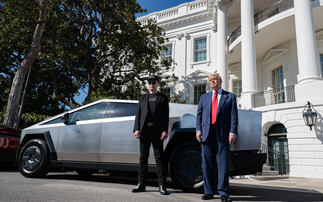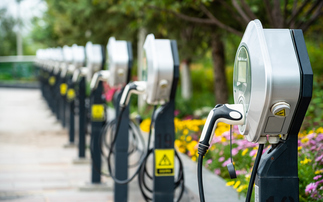Controversial assurances offered by Greg Clark to Nissan contain further good news for a green transport sector now set to reap the rewards from ClientEarth's successful legal action
A perfect storm is underway. Not the kind of perfect storm that sees high pressure, high temperatures and southerly breezes combine to leave the UK's cities choking in a pall of smog, but the kind of perfect storm where legal pressure, economic pressure, and public pressure force a fundamental rethink in how the government approaches an issue.
In the past few days, the government's decision to back Heathrow expansion, the controversial move to give Nissan the assurances it needed to step up investment in its Sunderland plant, and today's ruling Defra's air quality plan unlawful have all pointed to the fact a more ambitious clean air and green transport plan is urgently needed. The details Business Secretary Greg Clark has provided about the letter he sent to Nissan, the insistence Heathrow's third runway can only go ahead if air quality rules are complied with, and Defra's decision this morning not to contest the High Court ruling suggests the government has finally understood this fact. A much more ambitious approach to decarbonising road transport and tackling deadly air pollution now looks inevitable.
Let's take each of the developments in turn.
It is in the nature of Brexit that every answer the government provides begets yet more questions. Clark's refreshingly candid TV interview on Sunday and his appearance in the Commons earlier in the week may have given the clearest indication yet the government is planning a sectoral approach to the Brexit negotiations and could be willing to treat single market access as a higher priority than Theresa May's posturing party conference populism implied.
But that did not halt an avalanche of legitimate and pointed questions: what assurances will other sectors get? Why can't the letter to Nissan be published? If the letter won't be released on grounds of commercial sensitivity how can other auto firms be sure they are getting similar assurances? And, most importantly, what happens if other member states don't play ball on market access? One of the many tragedies of Brexit is the way in which even competent politicians - and there are few more competent in the current government than Clark - can appear swamped by the complexity and conflicting requirements of it all.
However, if the letter sparked pointed questions it also prompted some encouraging ones for the green economy. Clark reiterated one of the assurances offered to Nissan was that the government would "maintain a strong commitment to research and development, in particular the take-up of ultra-low emission vehicles", building on "Britain's strengths in low-carbon energy, the automotive sector, science, research and many other areas". Responding to questions in the Commons he added that "one of the great opportunities in industrial strategy is to combine our world leadership in offshore wind renewable energy with our commanding position in the automotive sector, and to bring them together so that when it comes to electrical vehicles and battery storage, we can lead the world, which is what we intend to do".
This commitment has firm foundations. The government has recognised it cannot meet its legally binding emissions reductions targets without much more focus on cutting transport emissions; it has recognised EVs are popular with the public; and it has recognised if it wants to convince auto firms to stay in the UK post-Brexit, risking tariffs in the process, it needs a compelling USP - unwavering support for the transition to ultra-low emission vehicles that most auto firms recognise they need to make provides that selling point. It is a little strange this revelation has come about because of Nissan's decision to invest in making more gas-guzzlers in the UK, but the government's commitment to continued support for green cars is now explicit.
Secondly, amid all the furore sparked by Theresa May's late conversion to the cause of Heathrow expansion an important caveat was largely overlooked. The government has said the project will only go ahead if it can be shown to meet air quality requirements. But controversial research showing how the expanded airport could be made compatible with air quality rules has been based on heroic assumptions about the projected decline in diesel vehicles and the adoption of EVs. It seems clear the government can only overcome this significant hurdle if it delivers a genuinely robust strategy to ensure this happy confluence of automotive trends comes to pass.
Given Heathrow will inevitably face legal action and the High Court has today signalled it gives short shrift to overly optimistic models predicting air quality will magically improve over time, Ministers will only be able to deliver Heathrow with a water-tight EV and air quality plan.
Thirdly, Defra's decision this morning to accept the High Court ruling and begin looking at options for bringing its air quality plan in line with the law means more ambitious measures must now follow. The government's apparent prioritising of cost and political considerations over legal obligations and the health of citizens looks shabby in the extreme, but it appears a second legal defeat in 18 months has prompted a welcome re-think. ClientEarth deserves a vote of thanks from the nation's lungs.
Cynics will fear Brexit could offer the government a chance to obfuscate, while counting down the days until a repeal of the clean air rules that have caused it so much legal embarrassment. But there is little desire within government to use Brexit to attack popular health and environmental protections, and, even if there were, such a move would run directly counter to Clark's desire to keep green auto giants sweet.
The key question now is how does the government respond to these inter-related pressures and the dawning realisation something must be done.
Thankfully, there are plenty of well-formed policy proposals for Ministers to draw on. It is likely that given the scale of the challenge the Treasury is going to have to open its wallet and back some form of diesel scrappage scheme, alongside increased investment in the low carbon buses and taxis that can have the biggest impact on urban air pollution. Making the case for such investment will inevitably be difficult at a time when finances are still tight, but there is a political dividend to be gained from the popularity of such scrappage schemes, as well as growing evidence low emission buses and taxis can deliver long term running cost savings.
Such investments would make it easier for the government to justify both Clean Air Zones that impose proper charges on diesel vehicles entering the most polluted areas and a revenue neutral recalibration of vehicle excise duty to incentivise greener vehicles. Ministers should also think seriously about where they can get the most bang for their buck and look at how facilitating the switch of corporate and public sector fleets to EVs will make a big dent in air pollution levels while also growing the market and delivering productivity gains. All these measures could then be reinforced by low or no cost policies that make green driving more attractive, such as preferential parking rates.
By focusing on these exciting new technologies Ministers should be able to minimise the impact of the inevitable 'war on motorist' headlines and position its green transport and air quality drive as a strategy that is both pro-motorist and pro-health.
From the High Court to Sunderland via Heathrow, a fair wind is currently blowing for EVs, and there are no signs of it changing direction any time soon.










